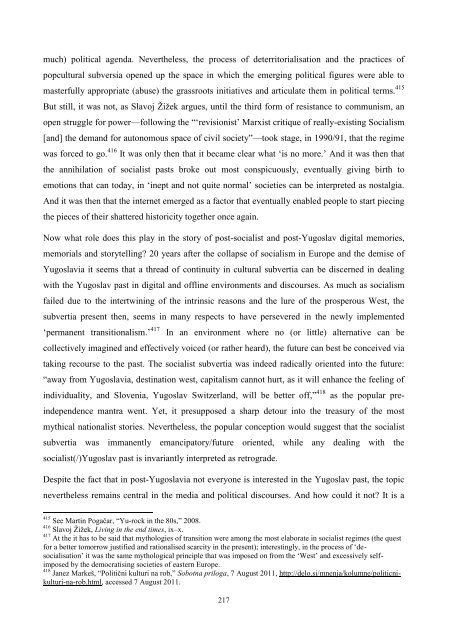UNIVERSITY OF NOVA GORICA GRADUATE SCHOOL ...
UNIVERSITY OF NOVA GORICA GRADUATE SCHOOL ...
UNIVERSITY OF NOVA GORICA GRADUATE SCHOOL ...
Create successful ePaper yourself
Turn your PDF publications into a flip-book with our unique Google optimized e-Paper software.
much) political agenda. Nevertheless, the process of deterritorialisation and the practices of<br />
popcultural subversia opened up the space in which the emerging political figures were able to<br />
masterfully appropriate (abuse) the grassroots initiatives and articulate them in political terms. 415<br />
But still, it was not, as Slavoj Ţiţek argues, until the third form of resistance to communism, an<br />
open struggle for power—following the ―‗revisionist‘ Marxist critique of really-existing Socialism<br />
[and] the demand for autonomous space of civil society‖—took stage, in 1990/91, that the regime<br />
was forced to go. 416 It was only then that it became clear what ‗is no more.‘ And it was then that<br />
the annihilation of socialist pasts broke out most conspicuously, eventually giving birth to<br />
emotions that can today, in ‗inept and not quite normal‘ societies can be interpreted as nostalgia.<br />
And it was then that the internet emerged as a factor that eventually enabled people to start piecing<br />
the pieces of their shattered historicity together once again.<br />
Now what role does this play in the story of post-socialist and post-Yugoslav digital memories,<br />
memorials and storytelling? 20 years after the collapse of socialism in Europe and the demise of<br />
Yugoslavia it seems that a thread of continuity in cultural subvertia can be discerned in dealing<br />
with the Yugoslav past in digital and offline environments and discourses. As much as socialism<br />
failed due to the intertwining of the intrinsic reasons and the lure of the prosperous West, the<br />
subvertia present then, seems in many respects to have persevered in the newly implemented<br />
‗permanent transitionalism.‘ 417 In an environment where no (or little) alternative can be<br />
collectively imagined and effectively voiced (or rather heard), the future can best be conceived via<br />
taking recourse to the past. The socialist subvertia was indeed radically oriented into the future:<br />
―away from Yugoslavia, destination west, capitalism cannot hurt, as it will enhance the feeling of<br />
individuality, and Slovenia, Yugoslav Switzerland, will be better off,‖ 418 as the popular preindependence<br />
mantra went. Yet, it presupposed a sharp detour into the treasury of the most<br />
mythical nationalist stories. Nevertheless, the popular conception would suggest that the socialist<br />
subvertia was immanently emancipatory/future oriented, while any dealing with the<br />
socialist(/)Yugoslav past is invariantly interpreted as retrograde.<br />
Despite the fact that in post-Yugoslavia not everyone is interested in the Yugoslav past, the topic<br />
nevertheless remains central in the media and political discourses. And how could it not? It is a<br />
415 See Martin Pogaĉar, ―Yu-rock in the 80s,‖ 2008.<br />
416 Slavoj Ţiţek, Living in the end times, ix–x.<br />
417 At the it has to be said that mythologies of transition were among the most elaborate in socialist regimes (the quest<br />
for a better tomorrow justified and rationalised scarcity in the present); interestingly, in the process of ‗desocialisation‘<br />
it was the same mythological principle that was imposed on from the ‗West‘ and excessively selfimposed<br />
by the democratising societies of eastern Europe.<br />
418 Janez Markeš, ―Politiĉni kulturi na rob,‖ Sobotna priloga, 7 August 2011, http://delo.si/mnenja/kolumne/politicnikulturi-na-rob.html,<br />
accessed 7 August 2011.<br />
217

















